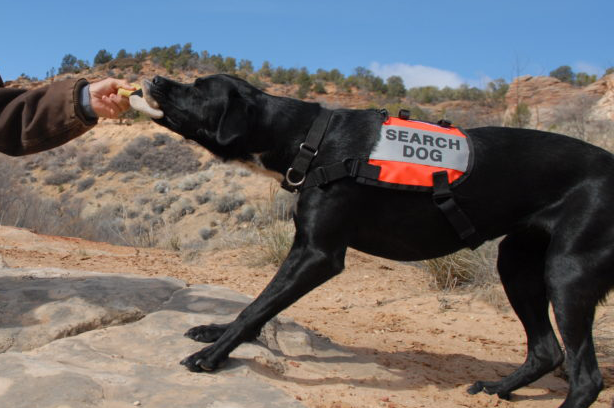Service dogs are individually trained to work or perform tasks for people with disabilities. A Service dog can be any dog breed or breed mix, and size. A service dog may be trained either by an organization or by an individual. Service dogs are not required to be certified, licensed, or display any service animal papers or tags. A service dog is not a pet. Service dogs assist people with disabilities in many different ways.
Types of Service Dogs
Physical or Neurological Disabilities
- Hearing impaired
- Visually impaired
- Mobility impaired
- Wheelchair assistance
- Balance assistance
- Retrieving
- Carry items
- Autism
- Dementia
Medical Alert
- Medication reminder
- Distract from pain
- Alert to physical changes that require medication
- Heart rate
- Breathing rate
- Odor
- Onset of migraine
- Impending seizures
- Glucose highs and lows
- Changes in human behavior
Psychiatric
- Traumatic brain injury (TBI)
- PTSD
- Intellectual disabilities
- Depression
- Offer deep pressure
- Wake person from nightmare
- Change current human behavior
- Grounding/Distracting
- Defuse panic attack
- Medication reminder
Types of Therapy / Assistance Dogs
- Crisis Response
- Courtrooms
- Hospitals
- Nursing Homes
- Schools
- Office Buildings
- Facility
- Reading Programs
- Educational Assistance
- Animal-assisted therapy
Types of Detection
- Search and Rescue
- Human remains
- Air-scent live find
- Tracking
- Scat
- Whale migration
- Desert Tortoises
- Prison contraband
- Drugs
- Bombs
- Human trafficking
- Contraband
- Cancer and infections
Other Careers
- Competitive sports
- Frisbee
- Fly ball
- Dock Diving
- Agility
- Nose work
Emotional Support Dog/Non-Service Dog
This dog offers comfort to their person and is classified as a pet. See www.ada.gov for special housing and some travel rights.
For more information about service dogs, go to:
http://www.ada.gov/service_animals_2010.pdf
http://www.ada.gov/svcanimb.htm
http://www.ada.gov/regs2010/smallbusiness/smallbusprimer2010.htm#serviceanimalsA
